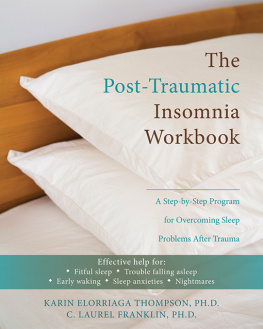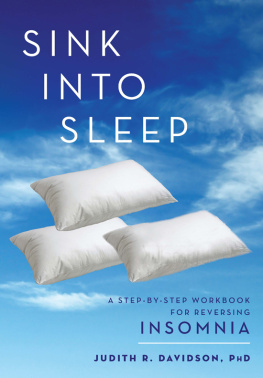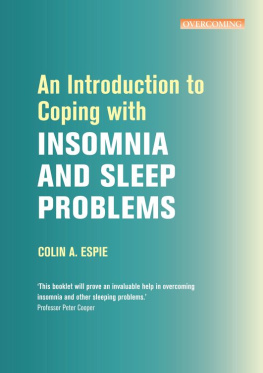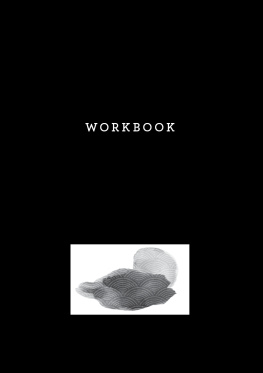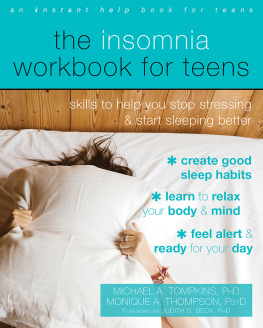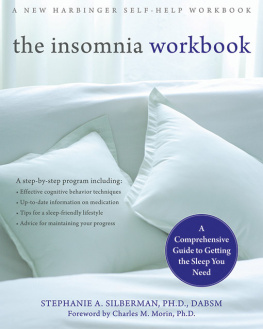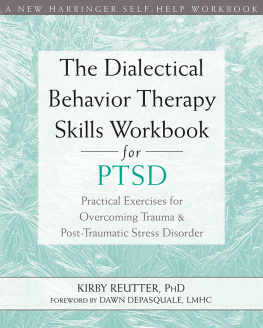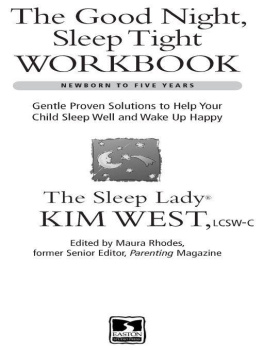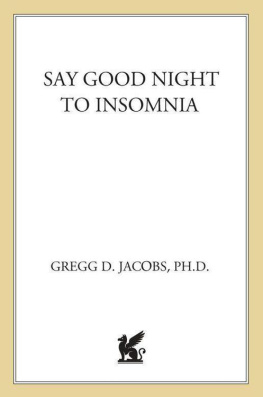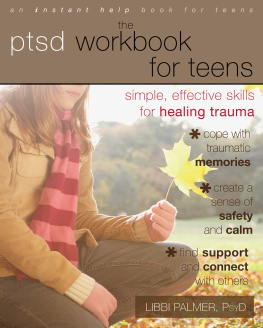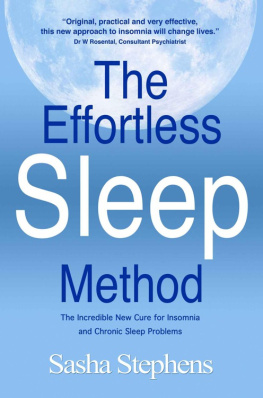Karin Elorriaga Thompson, Ph.D., is clinical assistant professor at Tulane University School of Medicine, Department of Psychiatry and Behavioral Sciences, and a clinical psychologist at the VA Medical Center, Memphis, TN. She specializes in psychotherapy, clinical research, and assessment related to psychological trauma.
C. Laurel Franklin, Ph.D., is clinical assistant professor at Tulane University School of Medicine, Department of Psychiatry and Behavioral Sciences, and a clinical psychologist at the Southeast Louisiana Veterans Health Care System in New Orleans, LA. Her clinical and research interests are in the area of assessment and treatment of trauma-related problems, including post-traumatic stress disorder (PTSD).

This workbook is a user-friendly self-help guide to improving sleep for trauma survivors who have developed sleep problems. I particularly like the fact that the book uses principles for sleep improvement that are empirically based, and presents them in a stepwise fashion that users will find easy to follow. While the primary audience of this book is trauma survivors themselves, I believe that trauma therapists will also find it valuable as a resource they can use directly or recommend to their clients.
David W. Foy, Ph.D., professor of psychology at Pepperdine University in Santa Clara, CA
Enhanced with clear worksheets and easy-to-understand, step-by-step instructions, Thompson and Franklin provide a procedurally adept, evidence-based, authoritative self-help guide to mastering complex insomnia and nightmares associated with PTSD.
Kenneth L. Lichstein, Ph.D., professor at the University of Alabama and director of the Sleep Research Project
This workbook provides a useful framework to guide therapists and self-help efforts. A number of useful tools for assessment and monitoring are included. The step-by-step program comprehensively addresses the thoughts and behaviors that tend to perpetuate sleep problems that are associated with PTSD.
Thomas A Mellman, MD, professor of psychiatry at Howard University in Washington, DC, and program director of its General Clinical Research Center
This workbook is a masterpiece and is something that mental health providers and patients have needed for a long time. It clearly provides a practical and systematic approach to addressing troublesome symptoms associated with PTSD. Mental clinics are swamped with combat veterans who need more than a pharmaceutical sleep aid.
Dennis L. Reeves, Ph.D., retired commander in the United States Navy and clinical neuropsychologist
The authors have done a masterful job of addressing the various types of sleeping problems that can wreak havoc in the lives of trauma survivors. This extremely well-organized and clearly written book breaks down the complex problem of getting a good nights sleep into simple but meaningful steps. It provides an abundance of solid suggestions and alternative ways that survivors can help themselves. This superb guide to overcoming sleeping problems is chock full of information and contains many excellent worksheets and innovative approaches to the make-or-break issue of adequate sleep. I highly recommend it for clients and mental health professionals alike.
Aphrodite Matsakis, Ph.D., post-traumatic stress disorder specialist and author of I Cant Get Over It
To sleep, perchance to dreamwithout nightmares, racing thoughts, or interruptions. This book uses a variety of exercises to increase the likelihood of sleep while challenging habits that interfere with restful, stressless sleep. The author also provides ways to lessen repetition of trauma-related nightmares so that dreaming can again become a time of restoration, not rumination. This book will be a source of gratitude for many trauma survivors as they relearn how to sleep and, perchance, to dream!
Mary Beth Williams, Ph.D., LCSW, CTS, author of The PTSD Workbook

Publishers Note
Care has been taken to confirm the accuracy of the information presented and to describe generally accepted practices. However, the authors, editors, and publisher are not responsible for errors or omissions or for any consequences from application of the information in this book and make no warranty, express or implied, with respect to the contents of the publication.
The authors, editors, and publisher have exerted every effort to ensure that any drug selection and dosage set forth in this text are in accordance with current recommendations and practice at the time of publication. However, in view of ongoing research, changes in government regulations, and the constant flow of information relating to drug therapy and drug reactions, the reader is urged to check the package insert for each drug for any change in indications and dosage and for added warnings and precautions. This is particularly important when the recommended agent is a new or infrequently employed drug.
Some drugs and medical devices presented in this publication may have Food and Drug Administration (FDA) clearance for limited use in restricted research settings. It is the responsibility of the health care provider to ascertain the FDA status of each drug or device planned for use in their clinical practice.
Common factors that impact sleep adapted from Morin, Charles M., and Colin A. Espie. 2003. Insomnia: A Clinical Guide to Assessment and Treatment. New York: KluwerAcademic/Plenum Publishers with kind permission from Springer Science and Business Media.
Calm Breathing exercise reproduced with permission of Guilford Publications, Inc., from Treating the Trauma of Rape, Edna B. Foa and Barbara O. Rothbaum, 1998; permission conveyed through Copyright Clearance Center Inc.
Progressive Muscle Relaxation exercise, Short Basic Progressive Muscle Relaxation exercise, Self-Hypnosis script, and Autogenic Relaxation exercise adapted with permission by New Harbinger Publications, Inc. The Relaxation and Stress Reduction Workbook, Martha Davis, Elizabeth Robbins Eshelman, and Matthew McKay. www.newharbinger.com.
Putting the Day to Rest technique and Bedtime Wind-Down technique adapted from Morin, Charles M., and Colin A. Espie. 2003. Insomnia: A Clinical Guide to Assessment and Treatment. New York: KluwerAcademic/Plenum Publishers with kind permission from Springer Science and Business Media.
Writing in Your Journal exercise adapted with permission by New Harbinger Publications, Inc. Writing to Heal, James W. Pennebaker. www.newharbinger.com.
Observe Your Thoughts and Experiences and Label Them exercise adapted with permission by New Harbinger Publications, Inc. Get Out Of Your Mind and Into Your Life, Steven C. Hayes and Spencer Smith. www.newharbinger.com.
Distributed in Canada by Raincoast Books
Copyright 2010 by Karin Elorriaga Thompson & C. Laurel Franklin
New Harbinger Publications, Inc.
5674 Shattuck Avenue
Oakland, CA 94609
www.newharbinger.com
All rights reserved
Printed in the United States of America
Acquired by Melissa Kirk; cover design by Amy Shoup; edited by Kayla Sussel; text design by Tracy Marie Carlson
___________
Epub ISBN: 978-1-60882-076-4
The Library of Congress has cataloged the print edition as:
Thompson, Karin E.
The post-traumatic insomnia workbook : a step-by-step program for overcoming sleep problems after trauma / Karin E. Thompson and C. Laurel Franklin.
Next page
